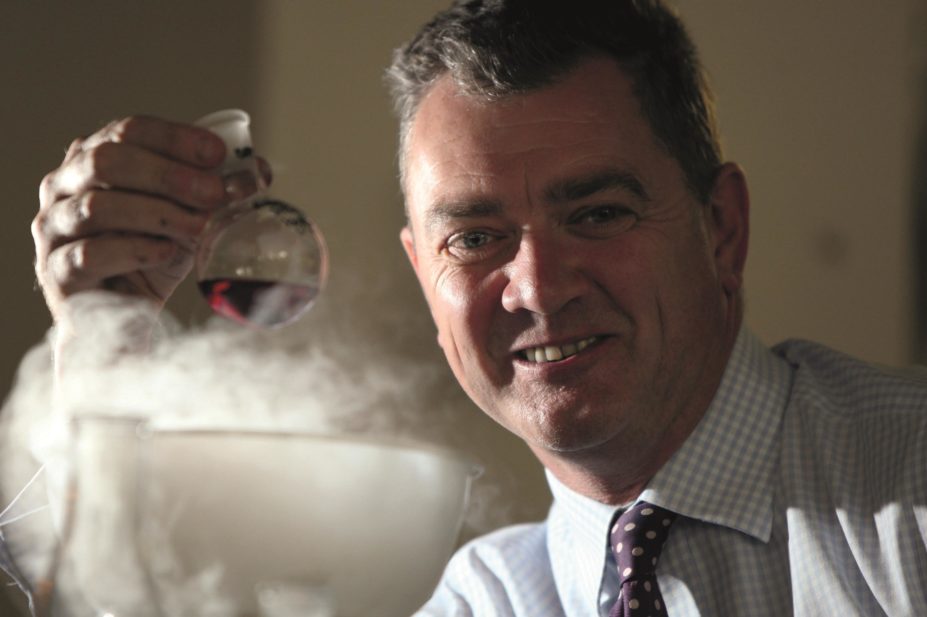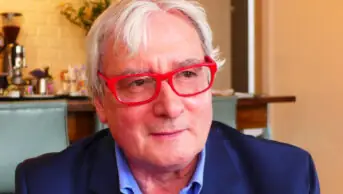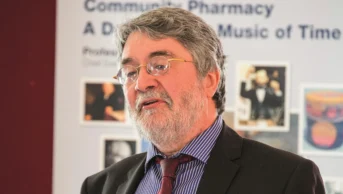
Chris McGuigan, a self-styled “drug hunter” and expert in nucleosides, used to keep a large red dice on his desk at Cardiff University where he was professor of medicinal chemistry. He said it reminded him not only of the long odds involved in research but also the role of luck in the development of new medicines.
“Drug discovery is a long and difficult process. Even to get a drug into first stage clinical trials into humans the odds are worse than one in 100,000,” he told the BBC in 2013.
But at the time of his death from cancer in March 2016, aged 57, four drugs developed in his Cardiff laboratory had progressed to human trials. He was particularly excited by the development of Acelarin, which he believed would change cancer therapies forever. It is currently in phase III clinical trials for the treatment of solid tumours.
Gary Baxter, head of the school of pharmacy and pharmaceutical sciences at Cardiff University, says: “It is rare for an academic scientist in the field of drug discovery to see one invention reach the stage of a clinical trial but Chris saw four of his compounds advance to human trials.
“In part, this could be attributed to the brilliance of Chris’s drug inventions (for the most part phosphoramidate nucleoside derivatives, known as ProTides, designed as antiviral and anticancer agents). But much of the success was a result of his inexhaustible drive and ambition to achieve clinical translation.
“His grasp of the complexities of the drug invention process, from design through preclinical and then human studies, and of the intellectual property processes required to translate the inventions, was masterful. Chris was no ‘ivory tower’ scientist.”
In 30 years in drug research, McGuigan published more than 200 scientific papers and submitted more than 100 patent applications. In July 2014, he launched — and became executive chair of — the Life Sciences Hub Wales, a collaborative venture involving universities, businesses, research centres, pharmaceutical companies and the NHS, designed to boost the economy in Wales. Backed with £100m from the Welsh government, the hub aims to raise an extra £1bn by 2022. “The main performance indicator is money and jobs,” said McGuigan. More than 60 organisations are now involved. In its first year the hub received 200 funding proposals and financed 56 of these.
My dream is that the next billion dollar discovery will stay in Wales, will create more jobs in Wales and I confidently believe that it will
Speaking in January 2015, McGuigan said: “During my career I’ve invented three new drugs that have gone into clinical trials — that’s a difficult step. At their peak they were worth US$3bn. And all of that left Wales because we didn’t have the infrastructure — we didn’t have a fund, we didn’t have a business community ready to invest, and we didn’t have a hub. Now, thanks to the commitment of ministers and government all that’s in place. My dream is that the next billion dollar discovery will stay in Wales, will create more jobs in Wales and I confidently believe that it will.”
He was also director of the Life Sciences Research Network Wales, a £15m initiative aimed at funding 100 new drug discovery projects across Wales.
Chris McGuigan was born in Leeds in August 1958, one of four brothers. He graduated from the University of Birmingham with first class honours in chemistry in 1979 and obtained his PhD in anticancer drug design from the same university in 1982.
After postdoctoral research in Canada and a demonstratorship at the University of Exeter, he held positions at University College London and the University of Southampton before being appointed reader, and then chair, in medicinal chemistry at Cardiff University. He was pro vice-chancellor for research at Cardiff University from 2012 to 2013, leading preparations for the Research Excellence Framework (REF) assessment exercise across disciplines.
This required the compilation of research of hundreds of academics and resulted in Cardiff coming fifth in the league table of 154 UK universities, compared with 22nd in the 2008 assessment exercise.
“This was a large strategic undertaking and he proved to be a dynamic and unifying leader,” said Baxter. “His stewardship and ability to engender team spirit and common purpose resulted in an exceptional outcome for Cardiff University.
“Professor McGuigan’s own ingenious drug design was the subject of two impact cases that were judged ‘outstanding’ by the REF panel,” he added.
In July 2015, McGuigan was appointed chief scientific officer to NuCana, a clinical stage biopharmaceutical company using proprietary ProTide technology to develop a portfolio of anticancer medicines.
The Royal Society of Chemistry highly commended him in its 2006 entrepreneur awards for his work in the preclinical and clinical development of a new family of antiviral agents.
In 2012, he won the science and technology section in the Inspire Wales awards. The citation said: “Professor McGuigan has a strong desire to use his scientific ideas for social good, with a noted ambition to address medical needs where they are unmet.”
In 2008, the school of pharmacy was awarded an innovation prize from Cardiff University for its collaboration with Inhibitex to develop a drug to target shingles.
McGuigan is survived by his wife, Maria, and daughters Phoebe and Grace.
You may also be interested in

Bill Scott OBE (1949–2025)

David Taylor (1946–2025)
